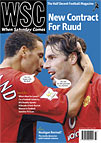 Laws in Argentina have been changed to protect badly run clubs. Martin Gambarotta examines the peso, the dollar and the 'inflation effect'.
Laws in Argentina have been changed to protect badly run clubs. Martin Gambarotta examines the peso, the dollar and the 'inflation effect'.
The president of Argentina, Néstor Kirchner, has a difficult job. The country owes bondholders from Tokyo to Milan $90 billion (£50bn). That’s a debt no football club can equal. Argentina defaulted on that debt in 2001. Back then the entire debt of the 20 first division football clubs amounted to $291m. The country was about to go up in flames and beloved football clubs were on the verge of burning with it. Boca Juniors, arguably the biggest club, had debts of 40 million pesos. But by 2002 people were asking: “Forty million what?”
Until then the local peso, thanks to some cunning financial engineering, was worth a dollar. That changed, literally, overnight. After a decade the peso was devalued and inflation, formerly negligible, returned. The politicos and the football chairmen were only happy to see it back. Inflation amounted to 41 per cent in 2002. A dollar is now worth about three pesos. Thanks to inflation the assets of clubs increased 90 per cent, according to Deloitte & Touche. Debts were kept in devalued pesos and not dollars by the new government. Deloitte & Touche call this “the inflation effect.”
Even before this Boca Juniors were able to boast of a re-emergence under businessman Mauricio Macri, who took over as chairman in 1995. Macri, the son of a well connected business tycoon, has turned Boca into a trophy-winning machine. The debt has been kept under the carpet. 2003 was an especially good year. Boca Juniors won the Copa Libertadores, the Intercontinental Cup and a league title. Boca TV, the country’s first cable channel devoted to a team, was launched.
Macri recently turned down an offer of $17m from Bayern Munich for striker Carlos Teves. “We could have accepted the offer and improved even more our financial situation,” Macri boasted. It’s all a far cry from the woes of yore. Older fans still remember one conniving president in the 1960s who promised to build a “city of sports” only to turn the club into a laughing-stock when all that was produced was a large vacant lot.
Macri’s commitment is partly political in motivation: he would like to be president one day. He lost mayoral elections in Buenos Aires against a progressive rival last year, but still thinks he has a political future and Boca are his best campaign advertisement.
Many observers say that Boca Juniors’ debts are manageable thanks mainly to the “inflation effect”. But other clubs don’t have it so good. Independiente, who won a league title in 2002, are 30m pesos in the red and struggling badly to service their debt. But even if Independiente go bust, they will keep on playing. Politicians and football executives have seen to that. A special law passed in 2000 ruled that clubs in administration can keep on playing, presumably to pay back debts. Independiente owe this piece of imaginative legislation to arch-rivals Racing Club. The law was purportedly especially designed to save Racing from bankruptcy. It also allowed clubs, which are technically non-profit organisations run by members, to be managed by private firms.
Fittingly Racing won the title in 2001 just when Argentina declared itself bust and people were out on the streets looking for politicians to lynch. Thousands of businesses went bankrupt at the time due to a four-year depression. But not football clubs. Congress declared in passing the law that sport was a “social right” of which the people could not be deprived due to financial technicalities. La Nación, a conservative daily paper, squealed in an editorial that this amounted to a blatant privilege. But nobody was listening.
Other clubs have been helped by the law. And then there are those who have tried to help themselves to the scraps of bust clubs.
A hidden camera planted by a television show last year caught out the judge named to manage bankrupt Buenos Aires club Ferro Carril Oeste. The judge was allegedly trying to flog part of the club’s property to somebody posing as a real estate agent. Ferro play in a middle-class neighbourhood where land is scarce and expensive. The judge was shown celebrating victories as Ferro, once a respected side who won the title in 1982 and 1984, gained promotion to division two.
Yet not even flagrant corruption can stop a club from playing. The “inflation effect” and the anti-bankruptcy law gives football pretty good protection from its own inefficiencies. Ask an expert if a team can snuff it because it is broke and he will give you one short answer: No.
From WSC 205 March 2004. What was happening this month